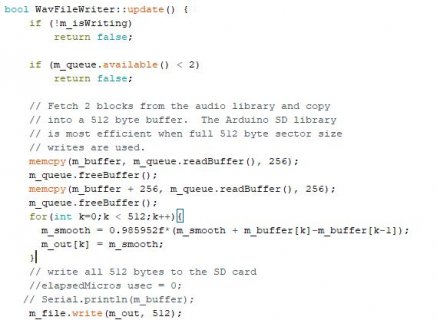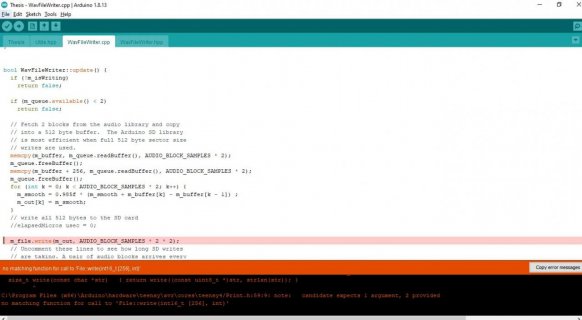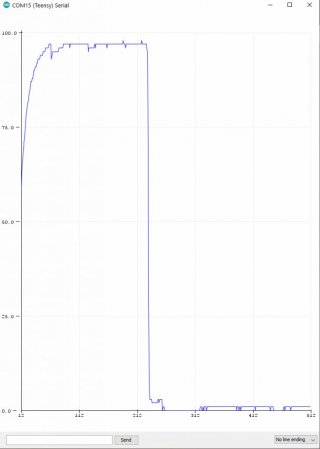////////////////////////////////////////////////////////////
////////////////////////////////////////////////////////////
//
// This code was inspired by the Recorder example of Paul Stoffregens Audio library
// and the SFML SoundFileWriterWav class
// Copyright (C) 2018 Maximilian Wagenbach (aka Foaly)
//
// This software is provided 'as-is', without any express or implied warranty.
// In no event will the authors be held liable for any damages arising from the use of this software.
//
// Permission is granted to anyone to use this software for any purpose,
// including commercial applications, and to alter it and redistribute it freely,
// subject to the following restrictions:
//
// 1. The origin of this software must not be misrepresented;
// you must not claim that you wrote the original software.
// If you use this software in a product, an acknowledgment
// in the product documentation would be appreciated but is not required.
//
// 2. Altered source versions must be plainly marked as such,
// and must not be misrepresented as being the original software.
//
// 3. This notice may not be removed or altered from any source distribution.
//
////////////////////////////////////////////////////////////
#include "WavFileWriter.hpp"
#include <SPI.h>
namespace {
// Teensy Audio Shield Defaults
const uint8_t SDcard_CS_Pin = 10;
const uint8_t SDcard_MOSI_Pin = 11;
const uint8_t SDcard_SCK_Pin = 13;
// Use these with the Teensy 3.5 & 3.6 SD card (Should work, but not yet tested)
//const uint8_t SDcard_CS_Pin = BUILTIN_SDCARD
//const uint8_t SDcard_MOSI_Pin = 11 // not actually used
//const uint8_t SDcard_SCK_Pin = 13 // not actually used
// Use these for the SD+Wiz820 or other adaptors (Should work, but not yet tested)
//const uint8_t SDcard_CS_Pin = 4
//const uint8_t SDcard_MOSI_Pin = 11
//const uint8_t SDcard_SCK_Pin = 13
// The following functions takes integers in host byte order
// and writes them to a stream as little endian
void encode(File& file, uint16_t value) {
uint8_t bytes[] =
{
static_cast<uint8_t>(value & 0xFF),
static_cast<uint8_t>(value >> 8)
};
file.write(reinterpret_cast<const uint8_t*>(bytes), sizeof(bytes));
}
void encode(File& file, uint32_t value) {
uint8_t bytes[] =
{
static_cast<uint8_t> (value & 0x000000FF),
static_cast<uint8_t>((value & 0x0000FF00) >> 8),
static_cast<uint8_t>((value & 0x00FF0000) >> 16),
static_cast<uint8_t>((value & 0xFF000000) >> 24),
};
file.write(reinterpret_cast<const uint8_t*>(bytes), sizeof(bytes));
}
}
WavFileWriter::WavFileWriter(AudioRecordQueue& queue) :
m_isWriting(false),
m_queue(queue)
{
}
bool WavFileWriter::open(const char *fileName, unsigned int sampleRate, unsigned int channelCount) {
if (m_isWriting) {
Serial.println("Cannot write WAV file. Already writing one.");
return false;
}
// Initialize the SD card
SPI.setMOSI(SDcard_MOSI_Pin);
SPI.setSCK(SDcard_SCK_Pin);
if (!(SD.begin(SDcard_CS_Pin))) {
Serial.println("Unable to access the SD card while trying to write WAV file.");
return false;
}
if (SD.exists(fileName)) {
SD.remove(fileName);
}
m_file = SD.open(fileName, FILE_WRITE);
if (!m_file) {
Serial.println("Could not open file while trying to write WAV file.");
return false;
}
m_queue.begin();
m_isWriting = true;
m_totalBytesWritten = 0;
writeHeader(sampleRate, channelCount);
return true;
}
bool WavFileWriter::isWriting() {
return m_isWriting;
}
void WavFileWriter::writeHeader(unsigned int sampleRate, unsigned int channelCount) {
// Write the main chunk ID
uint8_t mainChunkId[4] = {'R', 'I', 'F', 'F'};
m_file.write(mainChunkId, sizeof(mainChunkId));
// Write the main chunk header
uint32_t mainChunkSize = 0; // placeholder, will be written on closing
encode(m_file, mainChunkSize);
uint8_t mainChunkFormat[4] = {'W', 'A', 'V', 'E'};
m_file.write(mainChunkFormat, sizeof(mainChunkFormat));
// Write the sub-chunk 1 ("format") id and size
uint8_t fmtChunkId[4] = {'f', 'm', 't', ' '};
m_file.write(fmtChunkId, sizeof(fmtChunkId));
uint32_t fmtChunkSize = 16;
encode(m_file, fmtChunkSize);
// Write the format (PCM)
uint16_t format = 1;
encode(m_file, format);
// Write the sound attributes
encode(m_file, static_cast<uint16_t>(channelCount));
encode(m_file, static_cast<uint32_t>(sampleRate));
uint32_t byteRate = sampleRate * channelCount * 2;
encode(m_file, byteRate);
uint16_t blockAlign = channelCount * 2;
encode(m_file, blockAlign);
uint16_t bitsPerSample = 16;
encode(m_file, bitsPerSample);
// Write the sub-chunk 2 ("data") id and size
uint8_t dataChunkId[4] = {'d', 'a', 't', 'a'};
m_file.write(dataChunkId, sizeof(dataChunkId));
uint32_t dataChunkSize = 0; // placeholder, will be written on closing
encode(m_file, dataChunkSize);
m_totalBytesWritten += 44;
}
bool WavFileWriter::update() {
if (!m_isWriting)
return false;
if (m_queue.available() < 2)
return false;
// Fetch 2 blocks from the audio library and copy
// into a 512 byte buffer. The Arduino SD library
// is most efficient when full 512 byte sector size
// writes are used.
memcpy(m_buffer, m_queue.readBuffer(), 256);
m_queue.freeBuffer();
memcpy(m_buffer + 256, m_queue.readBuffer(), 256);
m_queue.freeBuffer();
for (int k = 0; k < 512; k++) {
m_smooth = 0.985f * (m_smooth + m_buffer[k] - m_buffer[k - 1]) ;
m_out[k] = m_smooth;
}
// write all 512 bytes to the SD card
//elapsedMicros usec = 0;
m_file.write(m_out, 512);
// Uncomment these lines to see how long SD writes
// are taking. A pair of audio blocks arrives every
// 5802 microseconds, so hopefully most of the writes
// take well under 5802 us. Some will take more, as
// the SD library also must write to the FAT tables
// and the SD card controller manages media erase and
// wear leveling. The m_queue object can buffer
// approximately 301700 us of audio, to allow time
// for occasional high SD card latency, as long as
// the average write time is under 5802 us.
//Serial.print("SD write, us=");
// Serial.println(usec);
m_totalBytesWritten += 512;
return true;
}
bool WavFileWriter::close() {
if (!m_isWriting)
return false;
m_queue.end();
while (m_queue.available() > 0) {
m_file.write(reinterpret_cast<const uint8_t*>(m_queue.readBuffer()), 256);
m_queue.freeBuffer();
m_totalBytesWritten += 256;
}
Serial.print("Done! Max no. of audio blocks used: ");
Serial.println(AudioMemoryUsageMax());
Serial.print("Bytes written: ");
Serial.println(m_totalBytesWritten);
m_file.flush();
// Update the main chunk size and data sub-chunk size
uint32_t mainChunkSize = m_totalBytesWritten - 8; // 8 bytes RIFF header
uint32_t dataChunkSize = m_totalBytesWritten - 44; // 44 bytes RIFF + WAVE headers
m_file.seek(4);
encode(m_file, mainChunkSize);
m_file.seek(40);
encode(m_file, dataChunkSize);
m_file.close();
m_isWriting = false;
return true;
}







